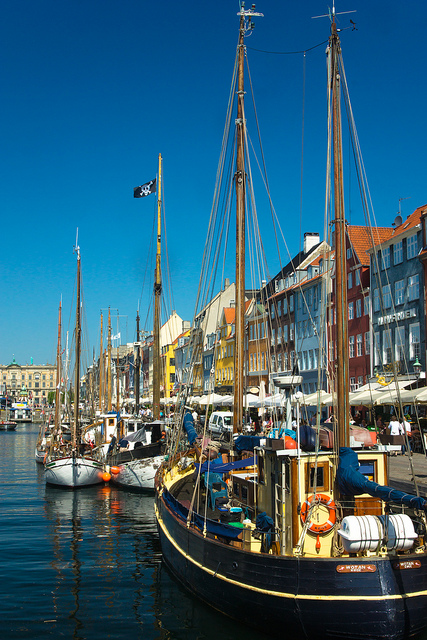Travel
My Travels
The Best Brewery in America?
At 3:59 p.m. on a former farm 20 miles (32 km) into the woods of rural Massachusetts, 150 people, most between the ages of 21 and 40, and from at least a half dozen U.S. states, queue in the dirt swept by winter winds behind a large, green aluminium shed no more than a decade old. Its door opens for the day at 4 p.m., but only for four hours. By 5 p.m., the queue outside the opened door will be 350-people long. This is the Tree House Brewing Company of Monson, Massachusetts. Hundreds have traveled to this unlikely location because Tree House is arguably the best artisinal brewer in the United States. In BeerAdvocatecom‘s ranking by thousands of people of the top 250 beers brewed in the U.S., three of the top five ( indeed, seven of the top U.S. 20) are from this shed, including the top beer. Tree House doesn’t distribute its products to pubs, restaurants, or stores. Its beer can only be gotten here. Yet none of its beer can be drunk here because the brewery doesn’t have a pub license. The first few hundred people waiting in queue will be allowed to buy a limited number of cans of beers (I bought two six-packs for $43), although those towards the back of the queue might be too late. An hour after the door opens, one of three of that day’s fresh-brewed varieties has sold out. By 6 p.m., a second is out. And by 8 p.m., no matter what, the door closes for another day.
In the Mood Today for East Asia
I’m in an eastern Asian mood today. Many things have reminded me of it. For instance, Thailand is renown for its Public Services advertisements on television. Here is a recent example, a full movie told in only three minutes: Click here to read Adweek’s story about why and how it was produced. The same producers two years earlier created a possibly even better Public Services short, about compassion: The story behind that one is here. ∅ Kudos to Chinese pharmaceuticals billionaire Li Jinyuan who took 6,400 of his employees on a nine-day vacation in France. They arrived aboard 84 commercial flights and occupied 140 hotels. the cost was €15 million ($18 million). ∅ Who exactly won? Forty years after Communist North Vietnam took over capitalist South Vietnam, an international poll reports that Vietnam is now the world’s most capitalist country. China was ranked fourth. ∅ When traveling to such places, or anywhere in the world, I’d always thought that the best passport to have was Swiss, because nobody blocks the politically neutral Swiss. However, CNN reports that the best passport to have is actually U.S. or U.K., followed by France, South Korea, or Germany, or Sweden, or Italy, or Denmark, Singapore, Finland, Japan, Luxembourg, or Netherlands, and only then Swiss. Those groupings are based upon how many countries the passport holder is allowed to enter either without a visa or by relatively easily obtaining a visa upon arrival at the border. One hundred forty-seven countries permit that for U.S. or U.K. passport holders. ∅ Speaking of travel, it was interesting to see the the CEO of the Starwood Hotel Group concede that his company’s Sheraton brand has become tired and in need of change. ∅ You might say that I’m sensitive to submarines. Although my naval officer father served aboard surface ships during World War II and the Korean Conflict, I grew up around New London, Connecticut, headquarters of the U.S. Navy’s submarine fleet. Seeing nuclear submarines silently leave that port (which was actually across the river in the town of Groton) was a routine sight. By far the most advanced submarines in the world are the Seawolf-class submarines constructed just after the end of the Cold War. These ships indeed are parts of a trio of U.S. ‘superweapons’ that no other nation possess. The other two in the trio are the super-accurate LGM-30G Minuteman III missiles (each capable of delivering within 30-minutes a thermonuclear warhead, […]
Meet Ahmet Merabet, The Muslim French Policeman Who Gave His Life Defending Freedom of Speech
Meet 49-year old Ahmet Merabet, a Muslim policeman from the 11th Arrondissement of Paris, who on Wednesday (7 January 2015) gave his life defending the right of free speech. He and 49-year-old policemen Franck Brinsolaro, a French Christian, where guarding the offices of the satirical weekly newspaper Charlie Hebdo when three Islamicist terrorists attacked with assault weapons, killing Merabet and Brinsolaro then 12 members of the newspaper’s editorial staff. It was Merabet’s death that was pictured in a spectator’s mobile phone video.
Roque de la Bonanza in Late Springtime
When photographing a black volcanic rock in bright sunlight, it extremely difficult to get details in the shadowy areas. It’s when a state-of-the-art, handheld light meter is worth its weight in digital cameras. Good postcard shot.
The Power and Pleasure of Color
Spring here in the Northern Hemisphere brings more color to the world, reminding me me of the power of color. Although the flowers and leaves have not yet blossomed where I am in Connecticut, this photo I took at a temple in Bali shows the power and pleasure of color.
Denmark, June 2013
Emma and I visited Denmark earlier this month. Here are eight photos. And videos from Copenhagen of Strolling down Strøget and Shipping out of Nyhavn.
Le Crazy Horse Saloon, circa 1960s
I’d like to post galleries of my photographs. So, this is largely at test of my technical integration WordPress and Adobe Lightroom. Rather than start with my photos, however, I’d discovered ten commercial slide photographs from someone’s trip to Le Crazy Horse Saloon in Paris during the 1960s. I’ve restored these formerly badly faded, half-century old photos, and now post here as a test of WordPress/Lightroom integration. These days, the photos are merely softly risque period pieces. See for yourself.
Mass Replacement of Workers by Robots Will Cause Massive Chinese Unrest
Here’s an technology story that portends civil unrest in China during the this and the next decade: SHENZHEN, July 29 (Xinhua) — Taiwanese technology giant Foxconn will replace some of its workers with 1 million robots in three years to cut rising labor expenses and improve efficiency, said Terry Gou, founder and chairman of the company, late Friday. The robots will be used to do simple and routine work such as spraying, welding and assembling which are now mainly conducted by workers, said Gou at a workers’ dance party Friday night. The company currently has 10,000 robots and the number will be increased to 300,000 next year and 1 million in three years, according to Gou. Foxconn, the world’s largest maker of computer components which assembles products for Apple, Sony and Nokia, is in the spotlight after a string of suicides of workers at its massive Chinese plants, which some blamed on tough working conditions. The company currently employs 1.2 million people, with about 1 million of them based on the Chinese mainland. For more than 60 years, the Chinese Communist Party has been carefully (some say dictatorially) trying to grow the Chinese economy without creating civil unrest resulting from first industrialization and lately a conversion to a capitalistic economy. How to keep the country fed when farmers are tempted to quit the plows for higher paying factory work? How to keep the factory workers happy without slowing down production or causing economic inflation? Etc. The bloody Tiananmen Square protests of 1989 showed just how close to boiling over social unrest is in the People’s Republic of China. If Foxconn, whose workforce is already anxious (some suicidally so), plans to replace a large number of workers with millions of robots, how soon before other Chinese factories similarly replace their own workers. What will such conversions means to the hundreds of millions of factory workers in China. Unemployment. Perhaps there employee retraining programs will be offered, but for hundreds of millions of workers? And to do what? During the early 1800s in Britain, textile workers who were replaced by machines protested and rioted. They were called Luddites, after a figure from English myth. I wonder what will we call the Chinese software factory workers who will be replaced by robots and who will surely protest and riot?






